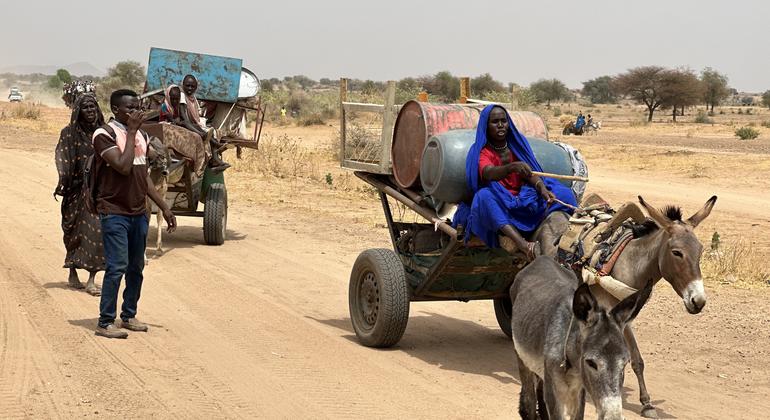Sudan: Dozens more areas at risk of famine as fighting hinders aid


The Zamzam camp is home to about 500,000 displaced people. and is located near the besieged capital of North Dufur, El Fasher, which has seen some of the fiercest fighting since the beginning of war between opposing military forces Sudan Armed Forces (SAF) and Rapid Support Forces (RSF) in April last year.
An estimated 10.7 million people have been displaced within Sudan, with another 2.1 million seeking refuge in neighbouring countries. The fighting has also caused a severe hunger crisis, with nearly 26 million people struggling to secure daily meals.
Access is very difficult
In an exclusive interview with United Nations NewsLeni Kinzli, Chief of Communications, World Food Programme (World food program) in Sudan, said Abdelmonem Makki that as many as 13 other areas across the war-torn country are also at risk of famine.
These are conflict areas like Darfur, Kordofan and Khartoum, where the situation is getting worse and making assessment very difficult, she said.
“Access to the refugee camps inside El Fasher, where fighting continues to rage daily between RSF paramilitary forces and the SAF, is extremely difficult,” she added.
The catastrophic famine in Khartoum
She said that some 90,000 people are facing dire famine in the capital Khartoumwhich just 18 months ago was a bustling city with no worries about food security.
“There are areas in Khartoum now where we hear that people are surviving by mixing whatever grain they have with water and drinking it once a day to survive.”
Increased support
WFP is scaling up emergency assistance efforts, focusing on people suffering from severe hunger across the country. The agency aims to reach and assist up to 8.4 million people by the end of the year..
“We are currently aiming to provide around 100,000 hot meals a month and continue to build on that to increase support. We have also signed up a longer list of financial service providers that we can provide cash support to,” said Kinzli.
“[However,] She added that one of the challenges to cash assistance since the crisis began is the liquidity and banking crisis that has also occurred in Sudan.
The agency is also helping to set up community kitchens and working with local non-governmental organizations (NGOs).
“We are looking at every way to support those in need, both through in-kind emergency food rations as well as cash and through community kitchens,” she said.
We cannot give up hope.
Ms. Kinzli emphasized The world cannot give up hope when it comes to the Sudan crisis, stressing that “we can certainly provide at the scale needed”.
“If we can support these areas, especially those caught in conflict and those at risk of famine, we can prevent many deaths and stop mass starvation and widespread malnutrition,” she said.
At the same time, she urged the warring parties to take into account the interests of the Sudanese people.
“Anyway, WFP will continue to do everything possible, regardless of the circumstances, to support and provide aid. to where people need it most.”




